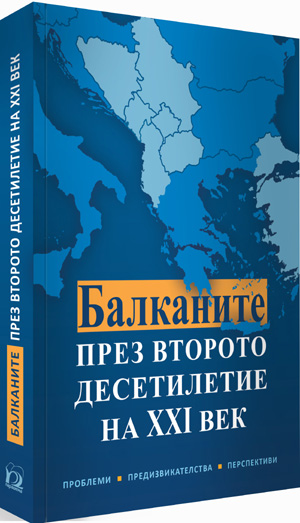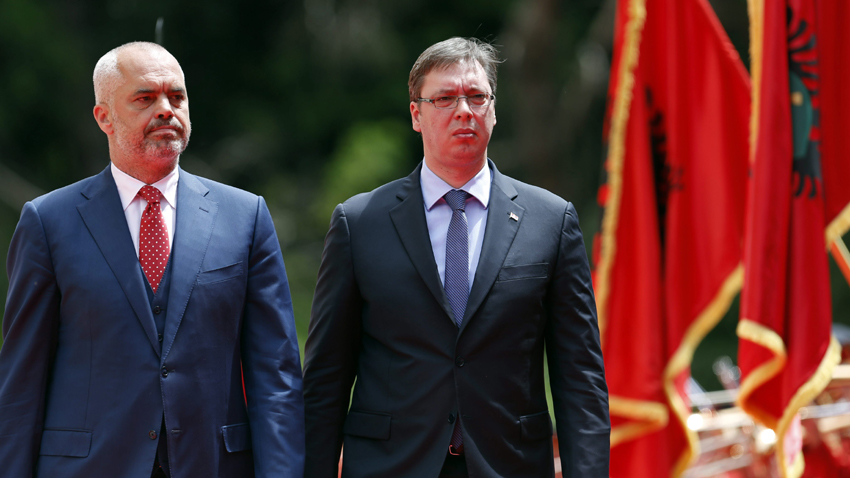In theses hot days the Bulgarian Academy of Sciences presented a book, dedicated to the Balkans. “The Balkans during the Second Decade of the 21st Century” was written by researchers from the Institute of Balkan Studies. The articles focus on contemporary processes in each one of the Balkan countries in a relatively calm period, characterized with intensifying of political and economic contacts on the road to European integration. Two of the authors told Radio Bulgaria more about the most complex and troubled relationships on the Balkans that had been obstacles to the integration of the Balkans.
 According to expert on modern history of Southeastern Europe Dr. Biser Banchev, there are two focuses when speaking about the integration of the Western Balkans. For the region this is a chance for progress in the sphere of competition and regional development. Brussels sees the integration through the prism of security – political, financial, energy… These two different views do not always meet. According to Dr. Banchev Podgorica and Belgrade reflect the two extremes in the integration of the Western Balkans. Montenegro tries hard to meet the political requirements for joining the EU and NATO, while Serbia focuses more on internal consolidation and stabilization of the economy.”
According to expert on modern history of Southeastern Europe Dr. Biser Banchev, there are two focuses when speaking about the integration of the Western Balkans. For the region this is a chance for progress in the sphere of competition and regional development. Brussels sees the integration through the prism of security – political, financial, energy… These two different views do not always meet. According to Dr. Banchev Podgorica and Belgrade reflect the two extremes in the integration of the Western Balkans. Montenegro tries hard to meet the political requirements for joining the EU and NATO, while Serbia focuses more on internal consolidation and stabilization of the economy.”
What are the obstacles before the integration?
“There are two kinds of obstacles. The first type are the objective obstacles like underdeveloped infrastructure and economy. More alarming are the subjective obstacles at a political level. Last year the EC said the Balkan countries could not expect joining the EU before 2020. The declaration was disappointing for many but actually the membership talks are a very long process. The situation in Greece shows that in the next 5-7 years structural funds will be depleted. This is the reason for rising Euroscepticism in Balkan countries. The case with Greece is a specific one but it shows simultaneous love and hatred towards the EU, which is characteristic feature of our societies.”
The road to European integration even changed relations between Serbs and Albanians. Historian and former ambassador to Albania and Kosovo, Dr. Bobi Bobev told us more.
“A moment has come when seeing a chance for European integration has a positive effect. This is the first case in history when all states on the Balkans have the same foreign policy goal. The relations between Albania and Serbia have been developing. In the past year the Serbian parliament speaker paid a visit to Albania. The Prime Ministers of the two countries also paid official visits. Analysts said the meetings were historical. This positive intensifying of the relations between Albania and Serbia has a positive effect on the overall political climate on the Balkans. On the other hand the dialogue between Pristina and Belgrade has achieved actual results. In Serbia and Kosovo politicians found out that their future EU membership depended on regulating their relations.”

In relation to the fears about the creation of so-called Great Albania, Dr. Bobev recalled that during the first joint sitting of the governments of Kosovo and Albania in January 2014 then-PMs Edi Rama and Hashim Thaci declared that union of Albanians will take place only through EU Membership.
English: Alexander Markov
If the general elections were to be held today, GERB-SDS would earn 24.5% of the votes, followed by Vazrazhdane with 13.7% and We Continue the Change – Democratic Bulgaria with 12.1%. BSP – United Left garners 8.8%, The Alliance for Rights and..
Parties from broad coalition in Romania face off on eve of elections Two months before the elections for president and for parliament in Romania, the ruling social democrats and liberals entered into a heated debate over the ruling by the..
European Commissioner for Home Affairs Ylva Johansson called for the abolition of land border controls for Bulgaria and Romania within the Schengen area by the end of the year. "Bulgaria and Romania have made every effort and have gone above..
The members of parliament will continue their session at 10 AM on November 22, following yet another unsuccessful attempt to elect a Speaker of the..

+359 2 9336 661
